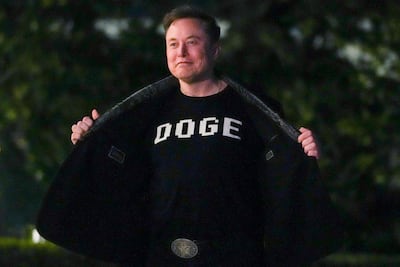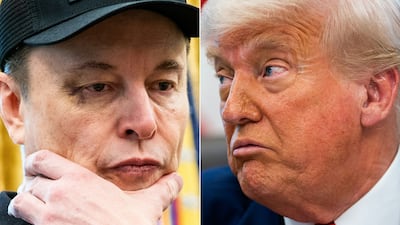Last year, the world's richest man, Elon Musk, lavished hundreds of millions of dollars on the presidential campaign of then-candidate Donald Trump, in a transparent effort to translate his vast wealth into personal political power. After Mr Trump returned to the White House, with Mr Musk in tow, it seemed that was indeed happening.
Mr Musk was such a regular fixture in the White House that there was even silly talk of a co-presidency. But now the billionaire is gone, unlikely to return to the Washington halls of power.
In truth, Mr Musk's tenure at the "Department of Government Efficiency" could have been better at its purported tax-cutting mission. Its goal, Mr Musk boasted in the lead-up to the election, was to save the federal government $2 trillion, though he later revised that figure to $1tn.
Yet despite pulling out chainsaws on stage and gloating over the mass sackings of eminent, respectable and dedicated public servants, not to mention the gutting of crucial public and human service programmes, he barely made a dent in the federal budget. The most charitable calculation of the actual “savings” incurred to date is around $175 billion, though Doge has published evidence purported to substantiate less than half of this.
Mr Musk seems especially proud of the de facto shuttering of the US Agency for International Development and the elimination of many of its key humanitarian programmes. Although Secretary of State Marco Rubio spent much of last week denying that anyone has died because of the elimination of these crucial programmes, some experts think that the only real question is only whether these deaths, in only a few weeks, must be counted in the thousands, tens of thousands, or hundreds of thousands.
Journalists and Democratic lawmakers have pointed out specific cases, such as individually named orphaned children in rural Africa who were depending for survival on HIV medicine that was suddenly yanked away by the world's richest man. They’re now verifiably and needlessly dead.
Despite pulling out chainsaws on stage and gloating over the mass sackings of public servants, Mr Musk barely made a dent in the federal budget
There are many other examples. But, as one Republican Senator, Joni Ernst, told constituents worried about their own health care last week: "Well, we are all going to die." That's as true of an impoverished African orphan as anyone else, from the point of view of a millionaire US senator or billionaire venture capitalist.
Apart from the decimation of programmes and mass dismissal of public servants, Mr Musk's tenure provided the public with a close look at his lifestyle. It is inspiring to those who think people ought to have more children. He has been energetically promoting large families, in both theory and in practice.
He has denied reports from The New York Times that he regularly consumed illegal drugs and amphetamines like Adderall. It might be unfair to speculate that as he was reshaping US government, Mr Musk was frequently in an altered state of consciousness. But we do know that Mr Musk and his crew had, with minimal oversight, access to the most sensitive data on not just public employees and the government, but taxpayers and the general public. The fate of this data is unknown.
An even more troubling reality is that his activities were unsupervised, unconfirmed and unvetted. He had no security clearance, or even a security clearance investigation. Mr Musk's Washington adventure illustrates exactly why the founders of the American republic insisted the Senate needed to confirm all senior appointees. This has become an increasingly marginalised procedure, but the wisdom of this check has been amply illustrated by the Musk-Trump transactional relationship.
While the two still praise each other, the actual chasm between them grows ever wider. Mr Musk has been increasingly vocal in condemning the "big, beautiful budget bill" that the Republican-dominated Senate is trying to pass at Mr Trump's behest. The billionaire says it is the antithesis of everything he was trying to do, since it may greatly increase the federal budget. He could never say any such thing if he were still connected to the White House.
Mr Trump increasingly had little time for his billionaire former buddy. You could see it coming from the very outset. The administration could not contain two alpha males, and Washington was never going to be big enough for both of them.
The only surprise is that Mr Musk lasted as long as he did. No one lasts too long in the spotlight next to Mr Trump.
The five pillars of Islam
The specs
AT4 Ultimate, as tested
Engine: 6.2-litre V8
Power: 420hp
Torque: 623Nm
Transmission: 10-speed automatic
Price: From Dh330,800 (Elevation: Dh236,400; AT4: Dh286,800; Denali: Dh345,800)
On sale: Now
The specs
Engine: 3.0-litre six-cylinder turbo
Power: 398hp from 5,250rpm
Torque: 580Nm at 1,900-4,800rpm
Transmission: Eight-speed auto
Fuel economy, combined: 6.5L/100km
On sale: December
Price: From Dh330,000 (estimate)
The specs
Engine: 4.0-litre V8 twin-turbocharged and three electric motors
Power: Combined output 920hp
Torque: 730Nm at 4,000-7,000rpm
Transmission: 8-speed dual-clutch automatic
Fuel consumption: 11.2L/100km
On sale: Now, deliveries expected later in 2025
Price: expected to start at Dh1,432,000
Profile box
Founders: Michele Ferrario, Nino Ulsamer and Freddy Lim
Started: established in 2016 and launched in July 2017
Based: Singapore, with offices in the UAE, Malaysia, Hong Kong, Thailand
Sector: FinTech, wealth management
Initial investment: $500,000 in seed round 1 in 2016; $2.2m in seed round 2 in 2017; $5m in series A round in 2018; $12m in series B round in 2019; $16m in series C round in 2020 and $25m in series D round in 2021
Current staff: more than 160 employees
Stage: series D
Investors: EightRoads Ventures, Square Peg Capital, Sequoia Capital India
The specs
Engine: 4.0-litre flat-six
Torque: 450Nm at 6,100rpm
Transmission: 7-speed PDK auto or 6-speed manual
Fuel economy, combined: 13.8L/100km
On sale: Available to order now
The most expensive investment mistake you will ever make
When is the best time to start saving in a pension? The answer is simple – at the earliest possible moment. The first pound, euro, dollar or dirham you invest is the most valuable, as it has so much longer to grow in value. If you start in your twenties, it could be invested for 40 years or more, which means you have decades for compound interest to work its magic.
“You get growth upon growth upon growth, followed by more growth. The earlier you start the process, the more it will all roll up,” says Chris Davies, chartered financial planner at The Fry Group in Dubai.
This table shows how much you would have in your pension at age 65, depending on when you start and how much you pay in (it assumes your investments grow 7 per cent a year after charges and you have no other savings).
|
Age
|
$250 a month
|
$500 a month
|
$1,000 a month
|
|
25
|
$640,829
|
$1,281,657
|
$2,563,315
|
|
35
|
$303,219
|
$606,439
|
$1,212,877
|
|
45
|
$131,596
|
$263,191
|
$526,382
|
|
55
|
$44,351
|
$88,702
|
$177,403
|
Company%20profile%20
%3Cp%3E%3Cstrong%3EName%3A%20%3C%2Fstrong%3EYodawy%3Cbr%3E%3Cstrong%3EBased%3A%3C%2Fstrong%3E%20Egypt%3Cbr%3E%3Cstrong%3EFounders%3A%20%3C%2Fstrong%3EKarim%20Khashaba%2C%20Sherief%20El-Feky%20and%20Yasser%20AbdelGawad%3Cstrong%3E%3Cbr%3ESector%3A%20%3C%2Fstrong%3EHealthTech%3Cbr%3E%3Cstrong%3ETotal%20funding%3A%20%3C%2Fstrong%3E%2424.5%20million%3Cbr%3E%3Cstrong%3EInvestors%3A%20%3C%2Fstrong%3EAlgebra%20Ventures%2C%20Global%20Ventures%2C%20MEVP%20and%20Delivery%20Hero%20Ventures%2C%20among%20others%3Cstrong%3E%3Cbr%3ENumber%20of%20employees%3A%3C%2Fstrong%3E%20500%3Cbr%3E%3C%2Fp%3E%0A
UNpaid bills:
Countries with largest unpaid bill for UN budget in 2019
USA – $1.055 billion
Brazil – $143 million
Argentina – $52 million
Mexico – $36 million
Iran – $27 million
Israel – $18 million
Venezuela – $17 million
Korea – $10 million
Countries with largest unpaid bill for UN peacekeeping operations in 2019
USA – $2.38 billion
Brazil – $287 million
Spain – $110 million
France – $103 million
Ukraine – $100 million
23-man shortlist for next six Hall of Fame inductees
Tony Adams, David Beckham, Dennis Bergkamp, Sol Campbell, Eric Cantona, Andrew Cole, Ashley Cole, Didier Drogba, Les Ferdinand, Rio Ferdinand, Robbie Fowler, Steven Gerrard, Roy Keane, Frank Lampard, Matt Le Tissier, Michael Owen, Peter Schmeichel, Paul Scholes, John Terry, Robin van Persie, Nemanja Vidic, Patrick Viera, Ian Wright.
Brolliology: A History of the Umbrella in Life and Literature
By Marion Rankine
Melville House
MATCH INFO
Al Jazira 3 (O Abdulrahman 43', Kenno 82', Mabkhout 90 4')
Al Ain 1 (Laba 39')
Red cards: Bandar Al Ahbabi (Al Ain)
Dr Amal Khalid Alias revealed a recent case of a woman with daughters, who specifically wanted a boy.
A semen analysis of the father showed abnormal sperm so the couple required IVF.
Out of 21 eggs collected, six were unused leaving 15 suitable for IVF.
A specific procedure was used, called intracytoplasmic sperm injection where a single sperm cell is inserted into the egg.
On day three of the process, 14 embryos were biopsied for gender selection.
The next day, a pre-implantation genetic report revealed four normal male embryos, three female and seven abnormal samples.
Day five of the treatment saw two male embryos transferred to the patient.
The woman recorded a positive pregnancy test two weeks later.
The candidates
Dr Ayham Ammora, scientist and business executive
Ali Azeem, business leader
Tony Booth, professor of education
Lord Browne, former BP chief executive
Dr Mohamed El-Erian, economist
Professor Wyn Evans, astrophysicist
Dr Mark Mann, scientist
Gina MIller, anti-Brexit campaigner
Lord Smith, former Cabinet minister
Sandi Toksvig, broadcaster
Jetour T1 specs
Engine: 2-litre turbocharged
Power: 254hp
Torque: 390Nm
Price: From Dh126,000
Available: Now
Expo details
Expo 2020 Dubai will be the first World Expo to be held in the Middle East, Africa and South Asia
The world fair will run for six months from October 20, 2020 to April 10, 2021.
It is expected to attract 25 million visits
Some 70 per cent visitors are projected to come from outside the UAE, the largest proportion of international visitors in the 167-year history of World Expos.
More than 30,000 volunteers are required for Expo 2020
The site covers a total of 4.38 sqkm, including a 2 sqkm gated area
It is located adjacent to Al Maktoum International Airport in Dubai South
Results
Women finals: 48kg - Urantsetseg Munkhbat (MGL) bt Distria Krasniqi (KOS); 52kg - Odette Guiffrida (ITA) bt Majlinda Kelmendi (KOS); 57kg - Nora Gjakova (KOS) bt Anastasiia Konkina (Rus)
Men’s finals: 60kg - Amiran Papinashvili (GEO) bt Francisco Garrigos (ESP); 66kg - Vazha Margvelashvili (Geo) bt Yerlan Serikzhanov (KAZ)
Blackpink World Tour [Born Pink] In Cinemas
Starring: Rose, Jisoo, Jennie, Lisa
Directors: Min Geun, Oh Yoon-Dong
Rating: 3/5





